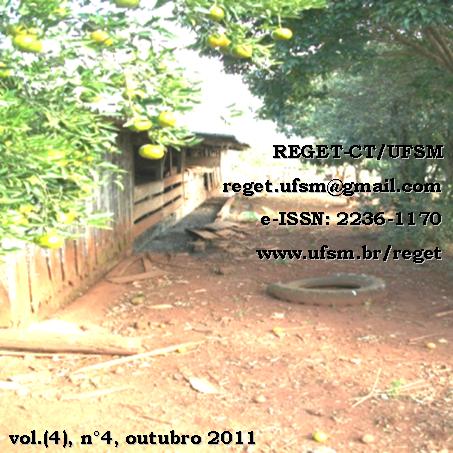TRABALHO TÉCNICO SOCIAL X MEIO AMBIENTE NOS PROGRAMAS HABITACIONAIS PÚBLICOS BRASILEIROS
DOI:
https://doi.org/10.5902/223611703908Keywords:
Society. Environment. Social policy.Abstract
This paper aims to disseminate the technical work that is developed in the Social Interest SocialPrograms of the Federal Government and that, although mandatory, is still unknown to a largesegment of society. It consists of a literature review organized in four stages. The first presents ahistorical perspective on social inequalities in our country recording the issues of rural exodus andmass migration to large cities, as well as damage to the environment due to this phenomenon. Thesecond step relates the history of the Policy for Social Housing since its first actions, even in theperiod of colonial Brazil, through the discussions of land ownership, the early twentieth century, atime when there was much migration to urban centers, the creation of the first agencies to dealwith the housing deficit in Brazil, in 1964, culminating in 2003 with the creation of the Ministry ofCities where social development policies began to be treated as priority issues in Government. Thethird step deals with the rise of Social Work Technical, concept, description and it mandatory inpublic programs. In conclusion, the study is the Environmental Education a mandatory targetwithin the Social Work Technician.
Downloads
References
BONDUKI, N. G. Origens da Habitação Social do Brasil. Arquitetura Moderna, Lei de Inquilinato e difusão da casa própria. São Paulo: Estação Liberdade, FAPESP, 1998.
CAIXA ECONÔMICA FEDERAL, Manual Normativo. Regulamento do Trabalho Técnico Social. AE 097v021, 2011. 76 p.pdf.
CARVALHO, R.; IAMAMOTO, M. V. Relações Sociais e Serviço Social no Brasil: esboço de uma interpretação históricometodológica.
São Paulo, Cortez, 1983.
FERREIRA, J.S.W.; UEMURA, M.M. Política Urbana. In: Ações Integradas de Urbanização e Assentamentos Precários. Curso à Distância. Módulo I. Disciplina I. Brasília: Ministério das Cidades, 2008.
GOMES, M.F.C.M. Política de Habitação e Sustentabilidade Urbana. In: GOMES, M.F.C.M; PELEGRINO, Ana Izabel de C. (orgs). Política de Habitação Popular e Trabalho Social. Coleção Espaços do Desenvolvimento. Rio de Janeiro: DP&A, Editora, 2005.
HERVÉ, Thery e MELO, Neli Aparecida de. Atlas do Brasil: disparidades e dinâmicas do território. 2.ed. São Paulo: EDUSP, 2008, p. 147.
INSTITUTO DE PESQUISAS APLICADAS – IPEA. Relatório Pobreza, desigualdade e políticas públicas. Comunicado da Presidência. N. 38.12 de Janeiro de 2010.
KOGA, D.; NAKANO, K. Perspectivas territoriais e regionais para políticas públicas brasileiras. In: ABONG. A Abong nas Conferências 2005 – Criança e Adolescente – Assistência Social. São Paulo: Cadernos Abong. 2005.
MARICATO, E. Urbanismo na periferia do mundo globalizado: metrópoles brasileiras. São Paulo em Perspectiva, v. 14 (out.-dez.). n. 4, 2000.
MONTIBELLER-FILHO, G. O Mito do Desenvolvimento Sustentável. 3ª ed. Ver e atual. –Florianópolis: Ed da UFSC, 2008.
NETTO, J.P. Ditadura e Serviço Social – Uma análise do Serviço Social no Brasil pós-64. São Paulo: Cortez, 1991.
PELICIONI, M. C. Educação Ambiental em Diferentes Espaços. Eds. – São Paulo: USP. Faculdade de Saúde Pública. Nisam. CepemaSignus Editora, 2007.
RODRIGUES, A. M. Conceito e definição de cidades. In: QUEIROZ R.L.C.; SANTOS Jr., O. A. (orgs). As metrópoles e a questão social brasileira. Rio de Janeiro: REVAN/FASE, 2007.
SANTOS, C.H.M. Políticas Federais de Habitação no Brasil: 1964/1998. Instituto de Pesquisas Aplicadas – IPEA. Texto para Discussão N. 654. Brasília, Julho de 1999.
WANDERLEY, L.E. Educação para a cidadania. In: Revista Serviço Social e Sociedade, n. 62, São Paulo: Cortez, 2000.





